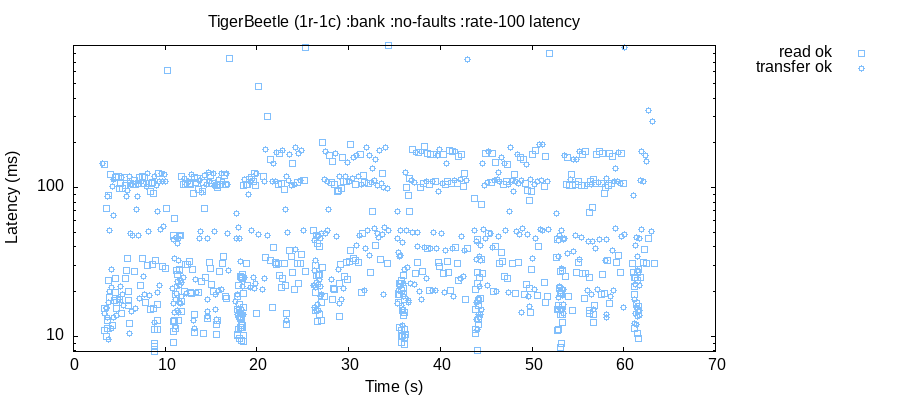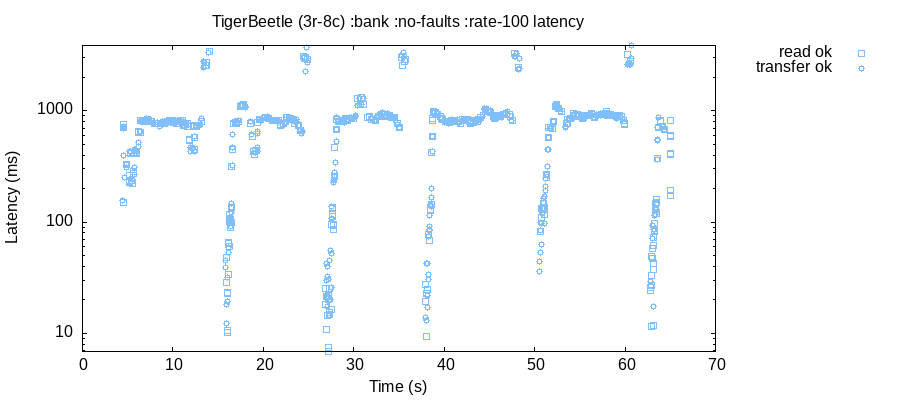A Jepsen Test for TigerBeetle.
- solidly grounded in research
- test culture
- devs are helpful in the chat
TigerBeetle is meaningfully tested during development, so why try Jepsen?
Jepsen is good:
- real running clusters
- real environmental faults
- existing tests and models evolved by finding bugs and increasing understanding time and time again
The thesis is that Jepsen's the map is not the territory black-boxing combined with its highly adapted property generators will be useful in contributing to TigerBeetle's development, serving to experientially validate and learn from the existing tests. The extensive existing testing will also necessitate enhancing the existing bank test to be most fruitful. Let's see what we can learn...
jepsen-tigerbeetle:
- builds
- tigerbeetledb/tigerbeetle
- tigerbeetledb/tigerbeetle-java (Jepsen is Clojure so uses Java client)
- can install/remove, setup/teardown, and start/stop arbitrary TigerBeetle replicas
- capture stdout/stderr, logs, and data files
Uses Jepsen's bank test.
; sample bank client operations
:invoke :transfer {:debit-acct 2, :credit-acct 1, :amount 3}
:ok :transfer {:debit-acct 2, :credit-acct 1, :amount 3}
:invoke :transfer {:debit-acct 1, :credit-acct 2, :amount 2}
:ok :transfer {:debit-acct 1, :credit-acct 2, :amount 2}
:invoke :read nil
:ok :read {1 -3, 2 3}Jepsen's bank checker insures:
- all totals match
:negative-balances?is respected- stats and plots
- snapshot isolation level of consistency
Treats TigerBeetle's immutable accounts, their creation, lookup, and ledgers as a grow only set.
Uses Jepsen's set-full checker.
The grow only set generates random operations of:
; sample set-full client operations
:invoke :add [ledger account]
:ok :add [ledger account]
:invoke :read [ledger nil]
:ok :read [ledger #{account account' ...}]TigerBeetle is designed for strict serializability so :linearizable? true is set for the checker.
-
Partitioning
-
Process kill, pause, and resume
-
Packet corruption
-
File corruption
Tests can target the leader for faults. Leadership can be like that :-).
Leader is determined by examining the logs for leadership view changes.
[jepsen node n1] Leader view on n1 : 12
[jepsen node n2] Leader view on n2 : 10
[jepsen node n3] Leader view on n3 : 11
:nemesis :info :start-partition [:isolated {"n1" #{"n2", "n3"}, "n2" #{"n1"}, "n3" #{"n1"}}]Leader partitioning is finding a new, to us, panic:
ring_buffer.zig:137:38: 0x3327e8 in ring_buffer.RingBuffer(vsr.replica.Prepare,32,ring_buffer.enum:10:27.array).push_assume_capacity (tigerbeetle)
error.NoSpaceLeft => unreachable,
^When cluster loses quorum, can inappropriately panic, IOW:
- # client sessions <= client count * client max concurrent
yet:
thread 91174 panic: session evicted: too many concurrent client sessions
Thundering hordes can come and go, kicking up some compaction on the way, and then they are all served and on their way.
All tests run to completion w/o errors. All reads/writes check consistent.
The experience prompted looking up the etymology of deterministic:
Middle English, from Anglo-French determiner, from Latin determinare,
from de- + terminare to limit,
from terminus boundary, limit
And these are known issues already identified by the LSM fuzzer. Tests were running against prior commits. 😔
There are some panics and cluster unavailability that jepsen-tigerbeetle is finding that are new.
An issue has been opened, random transactions (w/no environmental faults) can panic or cause the replica to become unavailable.
# no environmental faults
assert(it.data_block_index == Table.index_data_blocks_used(it.index_block));
assert(!compaction.data.writable);
and replica unavailability with looping timeouts in the logs
# with partitioning
assert(header.op <= self.op_checkpoint_trigger());
assert(self.op >= self.commit_max);
Now that we can run longer tests, let's run a test until it fails:
debug(tree): Transfer.id: compact_start: op=4295 snapshot=4293 beat=4/4
debug(tree): Transfer.id: compact_tick() for immutable table to level 0
thread 1361 panic: reached unreachable code
/root/tigerbeetle/zig/lib/std/debug.zig:225:14: 0x269bcb in std.debug.assert (tigerbeetle)
if (!ok) unreachable; // assertion failure
^
/root/tigerbeetle/src/lsm/compaction.zig:450:19: 0x48b380 in lsm.compaction.CompactionType(lsm.table.TableType(u128,lsm.groove.IdTreeValue,lsm.groove.IdTreeValue.compare_keys,lsm.groove.IdTreeValue.key_from_value,554112867134706473364364839029663282043,lsm.groove.IdTreeValue.tombstone,lsm.groove.IdTreeValue.tombstone_from_key),storage.Storage,lsm.table_immutable.TableImmutableIteratorType).cpu_merge_start (tigerbeetle)
assert(!compaction.data.writable);
And it turns out this was also found by TigerBeetle's LSM fuzzers: lsm_forest_fuzz.
How wonderful! 🎉
Possible data-point (or just confirming my biases 🙃):
- ✅ VOPR(+LSM) is proactively finding bugs that would express in real applications
- ✅ Application fuzzing can meaningfully explore the database state through the client
It's a nice mutual affirmation!
And with the bug fix in main, our tests pass too!
We can now run a straightforward relatively low rate test end-to-end.
Doing a range of different replica and client counts shows the latency distribution is very patterned, latency spikes/cycles ~128 operations, and correlates to WAL checkpoint messages in the log.
Seemed worthy of an issue, latency spike/cycle every ~128 operations, correlates with: replica: on_request: ignoring op=... (too far ahead, checkpoint=...) and it's a known issue.
(P.S. It's premature to partition or introduce other faults too heavily, doing so results in an un-runnable test.)
But after reading A Database Without Dynamic Memory Allocation:
Messages contain a checksum to detect random bit flips.
...
When combined with assertions, static allocation is a force multiplier for fuzzing!
had to try some file corrupting bit-flipping:
:bitflip {"n3" {:file "/root/tigerbeetle/data",
:probability 0.01}}and checksums FTW!
error(superblock): quorum: checksum=5049e012706e7b6148fc22259365415 parent=2667ef9fa317bccf04938708b745b0d2 sequence=2 count=1 valid=false
thread 5736 panic: superblock parent quorum lost
/root/tigerbeetle/src/vsr/superblock.zig:1530:21: 0x30c19f in vsr.superblock.SuperBlockType(storage.Storage).read_sector_callback (tigerbeetle)
return error.ParentQuorumLost;
^


